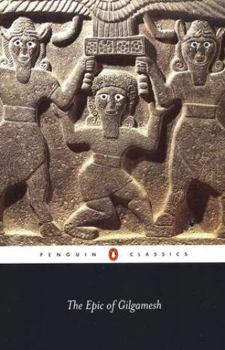The Epic of Gilgamesh
Select Format
Select Condition 
Book Overview
N. K. Sandars's landmark translation of one of the first and greatest works of Western literature A Penguin Classic
Gilgamesh, King of Uruk, and his companion Enkidu are the only heroes to have survived from the ancient literature of Babylon, immortalized in this epic poem that dates back to the third millennium BC. Together they journey to the Spring of Youth, defeat the Bull of Heaven and slay the monster Humbaba. When Enkidu dies, Gilgamesh's grief and fear of death are such that they lead him to undertake a quest for eternal life. A timeless tale of morality, tragedy and pure adventure, The Epic of Gilgamesh is a landmark literary exploration of man's search for immortality.
N. K. Sandars's lucid, accessible translation is prefaced by a detailed introduction that examines the narrative and historical context of the work. In addition, there is a glossary of names and a map of the Ancient Orient. For more than seventy years, Penguin has been the leading publisher of classic literature in the English-speaking world. With more than 1,700 titles, Penguin Classics represents a global bookshelf of the best works throughout history and across genres and disciplines. Readers trust the series to provide authoritative texts enhanced by introductions and notes by distinguished scholars and contemporary authors, as well as up-to-date translations by award-winning translators.
Gilgamesh, King of Uruk, and his companion Enkidu are the only heroes to have survived from the ancient literature of Babylon, immortalized in this epic poem that dates back to the third millennium BC. Together they journey to the Spring of Youth, defeat the Bull of Heaven and slay the monster Humbaba. When Enkidu dies, Gilgamesh's grief and fear of death are such that they lead him to undertake a quest for eternal life. A timeless tale of morality, tragedy and pure adventure, The Epic of Gilgamesh is a landmark literary exploration of man's search for immortality.
N. K. Sandars's lucid, accessible translation is prefaced by a detailed introduction that examines the narrative and historical context of the work. In addition, there is a glossary of names and a map of the Ancient Orient. For more than seventy years, Penguin has been the leading publisher of classic literature in the English-speaking world. With more than 1,700 titles, Penguin Classics represents a global bookshelf of the best works throughout history and across genres and disciplines. Readers trust the series to provide authoritative texts enhanced by introductions and notes by distinguished scholars and contemporary authors, as well as up-to-date translations by award-winning translators.
Format:Paperback
Language:English
ISBN:014044100X
ISBN13:9780140441000
Release Date:December 1960
Publisher:Penguin Classics
Length:128 Pages
Weight:0.63 lbs.
Dimensions:0.3" x 5.0" x 7.7"
Age Range:18 years and up
Grade Range:Postsecondary and higher
Customer Reviews
2 ratings
Book is in horrible condition. The front cover has been cut up and it looks to have water damage.
Published by DnA , 3 months ago
Haven't read the book yet
A work of art!
Published by Thriftbooks.com User , 19 years ago
Translating poetry is a tricky thing. Some people maintain that it can't be done. I would say that the translator can set himself three possible goals. First, he can try to create a "trot," a plain, "literal" translation where every word of the original is explained. See Nabokov's "Eugene Onegin" for an example of this. Second, he can try "simply" to translate it, to give his reader a good idea of what is there on the page, the mood, and so forth. LOTS of translators do this. Third, and most elusive, most difficult, is to create a work of literary art IN ENGLISH (or whatever the target language is). Hopefully this third goal will automatically include all the most important elements of "mere translation." But, if the translator succeeeds, he will have created an independent work of art which will then take on a life of its own. The most famous example of this would probably be FitzGerald's "Ruba'iyat of Omar Khayyam," probably better described as a fantasy and variations on themes of Omar Khayyam. Alexander Pope's translation of Homer's "Iliad" surely has legs, still in print after all these years. David Ferry has attempted the third goal in his translation of "Gilgamesh," and to my mind he succeeds. The result is a moving and beautiful work of literary art, and I predict a very long life for it.
The Epic of Gilgamesh Mentions in Our Blog

Enemies-to-Lovers
Published by Ashly Moore Sheldon • August 15, 2025
One of our favorite romance tropes has to be enemies-to-lovers. There's just something delicious about the fiery push and pull of a pair of would-be lovers treading the fine line between love and hate. Learn about the long history of enemies-to-lovers lit and explore some of our favorite subtropes. Plus a new TropeTote™!

Divine Inspiration
Published by William Shelton • March 14, 2023
From the earliest moments of mankind, even until today, our species has been compelled to look up and ponder our origin. This instinct naturally leant itself to the origin of books and writing itself, with much of the written word produced by mankind having been devoted to recording our beliefs.







